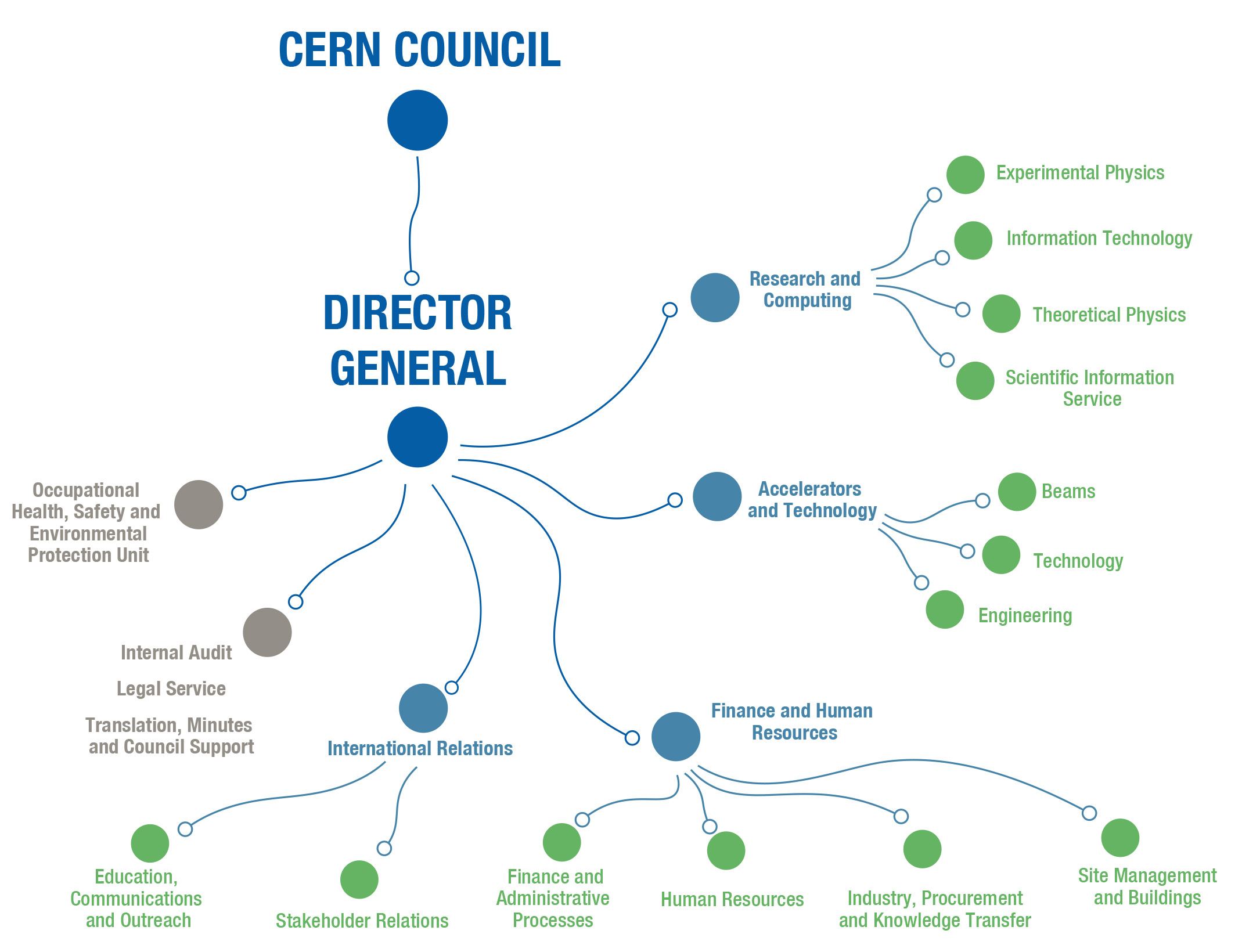Organisational profile
Studying the elementary particles
CERN, the European Organization for Nuclear Research, is the world’s leading laboratory for particle physics. Its mission is fundamental physics – exploring the fundamental constituents of matter and what the universe is made of. The main tool for research is the Organization’s unique network of particle accelerators, which collide beams of particles or direct them to fixed-target experiments. Giant detectors record the results of these collisions, providing data to thousands of physicists from all over the world for analysis.
A worldwide lab
Founded in 1954, CERN is an intergovernmental organisation headquartered in Meyrin, in the Canton of Geneva, Switzerland. It is governed by its 23 Member States. It also brings together eight Associate Member States and six Observers. It has become a prime example of international collaboration, uniting people from all over the world to push the frontiers of science and technology for the benefit of all.
CERN has two main campuses, the original Meyrin site on the French/Swiss border, and the Prévessin site in France. There are also smaller sites around the 27-kilometre ring of the Large Hadron Collider, LHC, situated in both countries. These are host to unprecedented experiments resulting from worldwide collaborations between nations, universities, and scientists.
Over 17 900 people from around the world work together on CERN-based projects, constantly advancing the limits of knowledge. Around 3600 of them are employed by CERN. They take part in the design, construction, and operation of the research infrastructures. CERN staff also contribute to the construction and operation of the experiments, as well as to the analysis of the data gathered for a vast community of users comprising over 12 500 scientists of 110 nationalities from institutes in more than 70 countries. Other personnel consists of associates, fellows, students, and contractors.
The frontiers of technology
CERN inspires visionary thinking. Since the beginning, it has been a trailblazer for technologies relating to accelerators, detectors and computing. As a laboratory with a long-term research plan, it continuously develops innovative technologies that benefit industry and society as a whole. CERN’s research contributes to medical and biomedical technologies, aerospace applications, safety, the environment, the handling of big data, cultural heritage, and emerging technologies.
Taking part in scientific associations
CERN is represented in several scientific associations including:
- ECFA, the European Committee for Future Accelerators
- ICFA, the International Committee for Future Accelerators
- EIROforum, the European Intergovernmental Research Organisation forum
CERN engages with many other scientific partners and multilateral entities around the world, for example having Observer Status at the United Nations.
Supply chain
With a long-run average annual spend of 500 MCHF, CERN has identified procurement as potentially materially important for the Organization’s environmental stewardship and subject to future discussion. CERN's status as an intergovernmental organisation shapes its procurement rules and processes. These currently involve competitive tendering and the adjudication of contracts to the lowest compliant bidder, or in some cases, the bidder offering best value for money. CERN procurement seeks to achieve balanced industrial returns for all CERN Member States. In 2018, 12% of CERN’s spending was on utilities, 25% on services including temporary labour, and 63% on supplies. In any given year, CERN carries out around 850 competitive tenders and places over 60 000 purchase orders or contracts.
Ethics and integrity
CERN is committed to fostering a harmonious, diverse and inclusive workplace, and has a number of tools in place to support this. Underpinning these tools are the CERN Staff Rules and Regulations, which spell out the roles and responsibilities of the Organization and its personnel. CERN also has a Diversity & Inclusion office and a full-time Ombudsperson. The CERN Code of Conduct was launched on 1 July 2010. It is the key tool in promoting and upholding standards of ethical behaviour and integrity at CERN.
The CERN Code of Conduct is a guide to help all those at CERN understand how to conduct themselves, treat others and expect to be treated. It is built upon five core values: Integrity, Commitment, Professionalism, Creativity and Diversity. Together, they serve to promote excellence and respect across the Organization. As well as having internal tools to ensure inclusiveness in the Organization, CERN also subscribes to a number of external initiatives. These include, but are not limited to, International Gender Champions, the EU Charter of Researchers and Code of Conduct for the Recruitment of Researchers, and the Geneva-based Le respect, ça change la vie.
CERN and the SDGs
The science and work carried out at CERN have an impact across many of the United Nations Sustainable Development Goals, SDGs. Five goals have been identified as particularly relevant for the Laboratory, namely Good health and well-being (3), Quality education (4), Industry, innovation and infrastructure (9), Peace justice and strong institutions (16), and Partnerships for the goals (17), and efforts are undertaken to ensure that the Organization contributes actively towards their implementation.
Governance

The Council
The CERN Council is the highest authority of the Organization and decides on CERN’s activities in scientific, technical and administrative matters as well as admission of new Member and Associate Member States. The Council is assisted by the Scientific Policy Committee and the Finance Committee. Each Member State has a single vote and most decisions require a simple majority.
Director-General
Appointed by the Council, usually for five years, the Director-General manages CERN, assisted by a Directorate composed of members proposed by the Director-General and endorsed by the Council. The Director-General reports directly to the Council.
Learn more
Questions regarding this report may be addressed to Environment.report@cern.ch.
